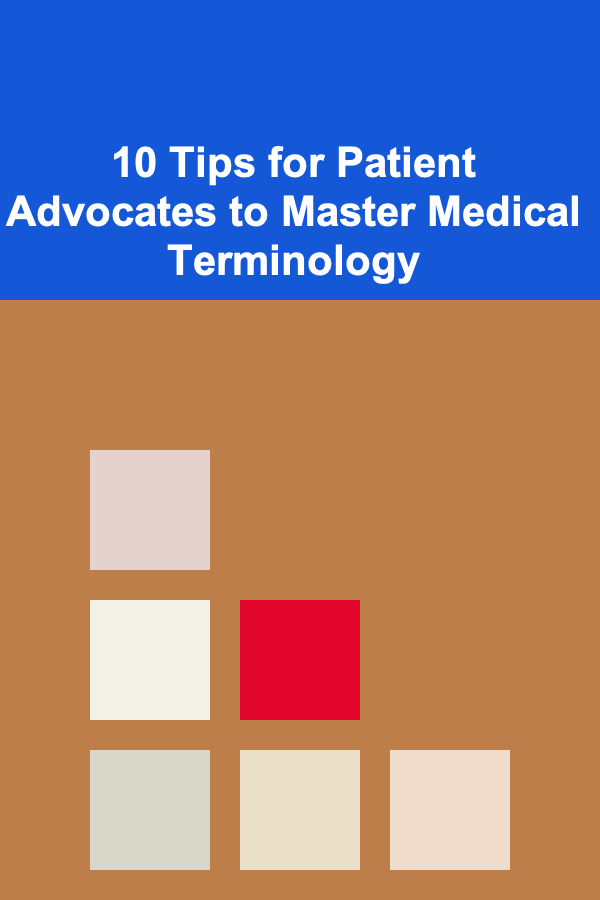
10 Tips for Patient Advocates to Master Medical Terminology
ebook include PDF & Audio bundle (Micro Guide)
$12.99$8.99
Limited Time Offer! Order within the next:

As a patient advocate, one of the most crucial responsibilities is to ensure that patients understand their health conditions and the treatments they receive. This requires not only empathy and communication skills but also a solid grasp of medical terminology. Medical terminology can be complex and overwhelming, but mastering it is essential for advocating effectively for patients, particularly in a healthcare environment where precision and clarity are paramount.
In this article, we will provide patient advocates with 10 practical tips to master medical terminology, which will ultimately enhance their ability to support patients and facilitate better communication between patients and healthcare professionals.
Start with the Basics: Root Words, Prefixes, and Suffixes
Understanding medical terminology begins with learning the structure of medical words. Medical terms are often made up of three key components: root words, prefixes, and suffixes. Familiarizing yourself with these components will allow you to break down complex terms into smaller, more manageable parts.
Root Words
Root words form the foundation of medical terms and usually describe a body part or a disease. For example:
- Cardi (heart)
- Derm (skin)
- Gastr (stomach)
Prefixes
Prefixes modify the meaning of the root word. They usually refer to location, number, or time. Some common examples include:
- Hyper- (above or excessive)
- Hypo- (below or deficient)
- Brady- (slow)
Suffixes
Suffixes often refer to conditions, diseases, or procedures. Some common suffixes include:
- -itis (inflammation)
- -ectomy (surgical removal)
- -ology (study of)
By mastering these basic components, patient advocates can quickly decipher unfamiliar medical terms and improve their understanding of complex medical language.
Use Flashcards to Reinforce Learning
One effective way to memorize medical terms is by using flashcards. Flashcards provide a simple, interactive way to reinforce your knowledge and improve recall. You can create your own flashcards or use apps that are specifically designed to help with medical terminology learning.
How to Create Effective Flashcards:
- Write the medical term on one side and the definition or explanation on the other side.
- Include any relevant root words, prefixes, and suffixes to help break down the term.
- Include common examples or illustrations to visualize the term's meaning.
- Review regularly to reinforce your memory.
This repetition of terms will help you absorb medical vocabulary over time and be able to recall it more easily when needed in patient advocacy scenarios.
Learn Medical Terminology in Context
Rather than memorizing isolated terms, learning medical terminology within a clinical context can enhance your understanding and retention. For example, when studying conditions such as "bronchitis" or "arthritis," you should not only learn the term but also its context in terms of symptoms, treatment, and common scenarios in which it's used.
How to Learn in Context:
- Read Medical Literature: Journals, books, or websites geared toward medical professionals will often explain terms in context.
- Use Case Studies: Study real-world case studies where medical terminology is applied to patient care. This will help you understand the meaning behind the terms and how they affect patient outcomes.
- Listen to Healthcare Professionals: Whether through podcasts, interviews, or lectures, listening to doctors, nurses, or other professionals talk about patient care can expose you to how medical terms are used in practice.
Learning medical terminology in context will give you a clearer picture of how these terms directly impact patients' care and treatment plans.
Understand Common Medical Abbreviations and Acronyms
In the medical field, abbreviations and acronyms are widely used for convenience and efficiency. Familiarizing yourself with the most common abbreviations will allow you to quickly interpret patient charts, medical reports, and healthcare documents.
Some common medical abbreviations include:
- BP (Blood Pressure)
- HR (Heart Rate)
- CNS (Central Nervous System)
- EKG (Electrocardiogram)
Tips for Mastering Abbreviations:
- Create a list of commonly used abbreviations in your specific field of advocacy.
- Focus on learning those that appear most often in patient communications, medical records, and charts.
- Use mnemonic devices to help you remember abbreviations and their meanings.
By being familiar with these abbreviations, you can more effectively read and interpret healthcare information without confusion.
Take Medical Terminology Courses
If you are serious about mastering medical terminology, enrolling in a course can provide structured learning and help you systematically build your knowledge. Many online platforms offer courses in medical terminology, often designed for beginners and intermediate learners.
What to Look for in a Course:
- Comprehensive Curriculum: A good course will cover the foundational aspects of medical terminology, such as root words, prefixes, and suffixes, and will also teach how to use these components to understand complex terms.
- Practical Application: Look for courses that offer real-world examples and interactive exercises, such as quizzes, to apply the knowledge.
- Accreditation: If you need the course for professional development or certification, make sure it's accredited by relevant institutions.
By taking a medical terminology course, you can solidify your understanding and gain confidence in using medical terms in patient advocacy.
Practice Medical Terminology in Real-Life Situations
The best way to learn any language, including medical terminology, is through practice. Try incorporating medical terms into your daily work as a patient advocate. For instance, when speaking with healthcare providers, ask for clarification or definitions of terms that you don't understand. This will provide real-time learning opportunities.
How to Practice:
- Ask Questions: When healthcare providers use medical terms you don't understand, ask for an explanation. This not only helps you learn but also builds rapport with the medical team.
- Take Notes: During patient interactions, take notes of unfamiliar terms and review them later.
- Simulate Scenarios: Practice explaining complex medical terms in simple language to patients or their families. This will help reinforce your understanding of the terms.
By using medical terminology regularly, you can reinforce your knowledge and become more comfortable using it in patient advocacy settings.
Use Medical Dictionaries and Online Resources
There are numerous online resources, including medical dictionaries, glossaries, and apps, that can help patient advocates quickly reference and learn medical terms. Websites like MedlinePlus, Mayo Clinic, and WebMD offer comprehensive definitions and explanations of medical terms.
Recommended Resources:
- Stedman's Medical Dictionary: A comprehensive medical dictionary used by healthcare professionals.
- MedlinePlus: A reliable and accessible resource for understanding medical terms and conditions.
- Medical Terminology Apps: Several apps, such as Quizlet, can help you practice medical terms with flashcards and quizzes.
These resources can serve as valuable references when you come across unfamiliar terms while working as a patient advocate.
Stay Up-to-Date with Medical Advancements
The medical field is constantly evolving, with new conditions, treatments, and terminology emerging regularly. To stay proficient in medical terminology, it's important to keep up with the latest trends, diseases, and treatment methods.
How to Stay Informed:
- Subscribe to Medical Journals: Reading medical journals will expose you to the latest terminology used in medical research and clinical practice.
- Attend Conferences and Webinars: Healthcare conferences and online webinars often feature discussions on new medical terms, technologies, and practices.
- Join Medical Forums: Participate in forums or online communities where healthcare professionals discuss new medical terminology and treatments.
By staying informed about the latest medical developments, you will continue to expand your knowledge and remain current on evolving terminology.
Collaborate with Healthcare Providers
As a patient advocate, one of your most valuable resources is the healthcare team. Building relationships with doctors, nurses, and other medical professionals allows you to ask questions about medical terms, learn from their experience, and gain a deeper understanding of the language they use.
Tips for Effective Collaboration:
- Ask for Clarification: Don't be afraid to ask healthcare providers to explain medical terms or concepts you are unfamiliar with.
- Review Medical Records: Ask for opportunities to review patient records with the medical team to see how terms are used in context.
- Attend Rounds or Meetings: If possible, attend patient rounds or meetings where healthcare professionals discuss patient cases, as this provides opportunities to learn medical terminology in real time.
By collaborating closely with healthcare providers, you can expand your vocabulary and improve your ability to navigate medical terminology.
Be Patient and Persistent
Mastering medical terminology is not something that happens overnight. It requires patience, practice, and persistence. Don't be discouraged if you encounter challenging terms or concepts---keep practicing, and over time, your ability to understand and use medical terminology will improve.
How to Stay Motivated:
- Set Small Goals: Break your learning into manageable steps, such as mastering 10 new terms each week.
- Celebrate Progress: Acknowledge your progress along the way, whether it's understanding a complex term or successfully explaining medical information to a patient.
- Keep a Learning Journal: Document new terms and their meanings in a notebook or digital format. This will help you track your progress and serve as a useful reference.
By staying committed to learning and practicing, you will eventually master medical terminology and become a more effective patient advocate.
Conclusion
Mastering medical terminology is an essential skill for patient advocates. With a solid understanding of medical terms, patient advocates can better communicate with healthcare professionals, support patients in understanding their diagnoses and treatments, and ultimately improve the quality of care patients receive.
By following the tips outlined in this article---such as learning the basics of medical terminology, practicing in real-world situations, and staying informed on medical advancements---patient advocates can enhance their expertise and provide invaluable assistance to patients navigating the complex world of healthcare.
Reading More From Our Other Websites
- [Stamp Making Tip 101] How to Create Custom Stamps for Bullet Journaling Enthusiasts
- [Organization Tip 101] How to Set Up a Sibling Sharing System for Toys
- [Home Pet Care 101] How to Prepare Your Home for Bringing Home a New Pet
- [Home Renovating 101] How to Choose the Right Interior Painting Techniques for High-Traffic Areas
- [Home Security 101] How to Protect Your Home from Home Invasion and Theft
- [Personal Care Tips 101] How to Make a Facial Scrub with Oatmeal for Sensitive Skin
- [Home Storage Solution 101] How to Design a Functional Shelf Storage System for Your Home
- [Home Party Planning 101] How to Mix and Match Party Themes for an Eclectic Home Gathering
- [Personal Care Tips 101] How to Choose the Right Hair Mask for Your Hair Type
- [Home Security 101] How to Choose the Right Burglar Alarms for Houses: A Comprehensive Guide

How to Make Your Living Room Look Expensive on a Budget
Read More
How to Use Security Signs and Stickers to Deter Burglars
Read More
How To Use Storytelling in Your Content
Read More
How to Explore the Majestic Fjords of Norway
Read More
Understanding Video Compression for the Web
Read More
How to Develop a Winning Attitude
Read MoreOther Products

How to Make Your Living Room Look Expensive on a Budget
Read More
How to Use Security Signs and Stickers to Deter Burglars
Read More
How To Use Storytelling in Your Content
Read More
How to Explore the Majestic Fjords of Norway
Read More
Understanding Video Compression for the Web
Read More